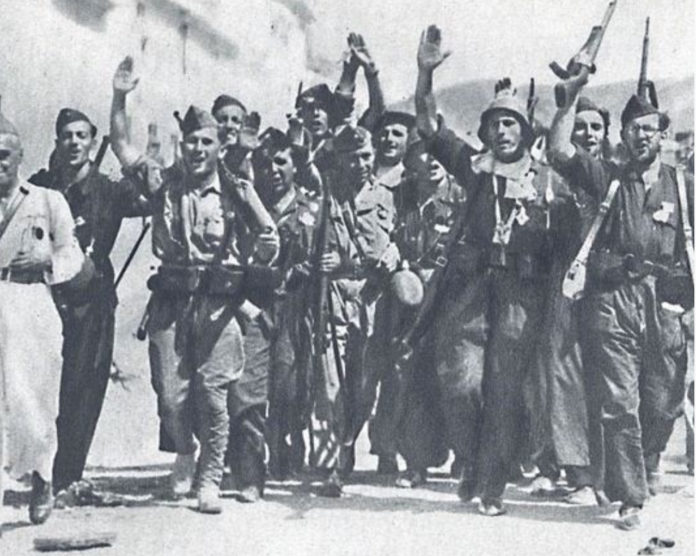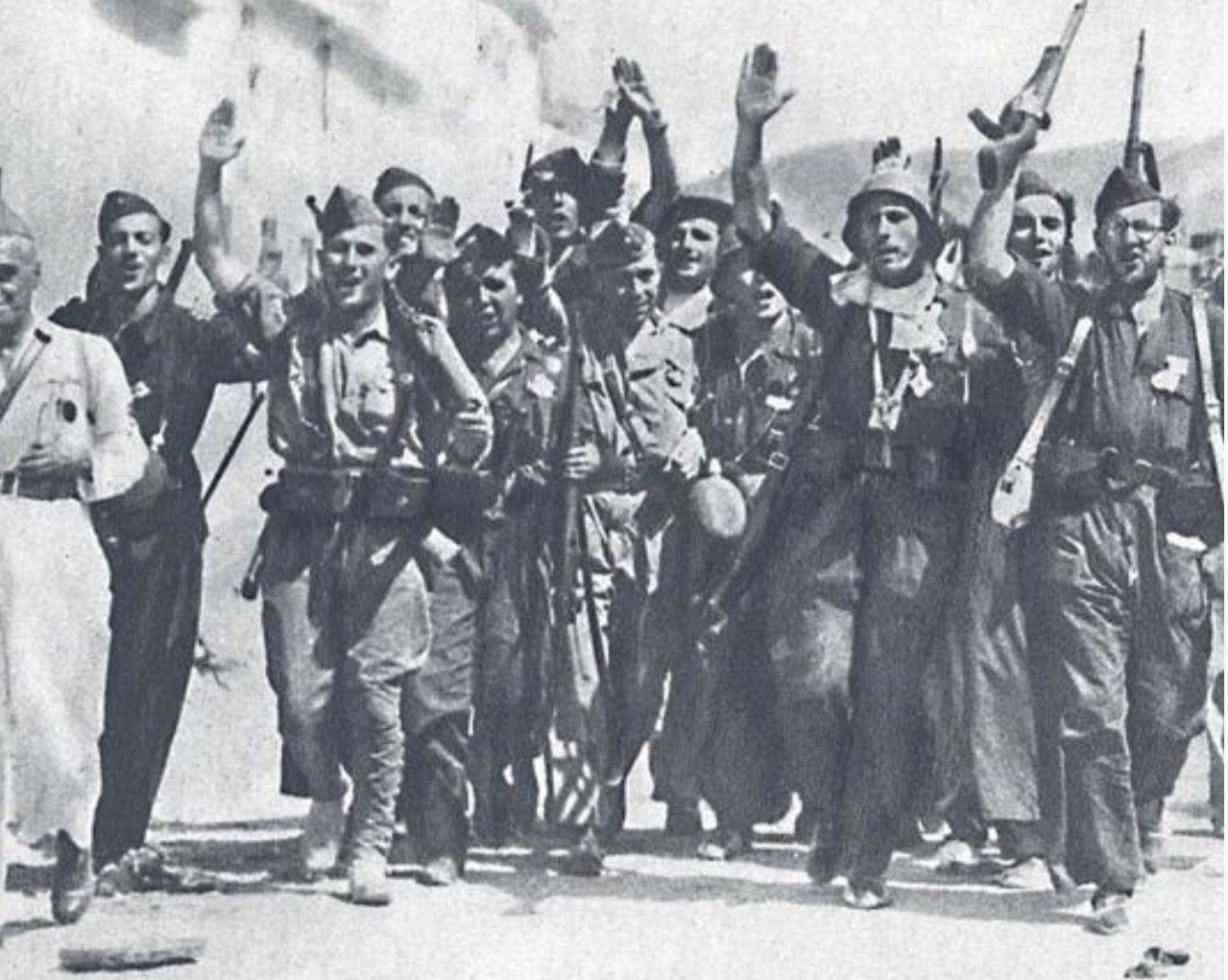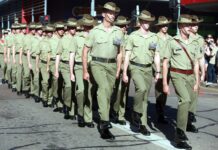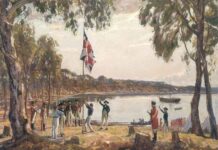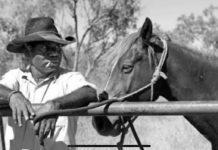From Patriotic Alternative.
Bill Atheling
In the years following the Great War, new politically and socially dynamic nationalist and fascist European movements began to emerge and grow, clashing with both the recalcitrant liberal political elite and multiple incarnations of international communism. These manifestations ensured that seismic ideological and geo-political struggles would come to characterise the last century with a polarisation in political attitudes that would ultimately lead to the disaster of the Second World War and the uneasy stalemate of the Cold War.
The Spanish Civil War was one manifestation of these violent upheavals and the subsequent reportage by the British media was an example of how far this polarisation had already gone, especially as Britain was a non-combatant nation.[1] It was a war where the new compact and lightweight 35mm camera allowed photojournalists to get much closer to the front and record under fire, it came at a time when the new lavishly illustrated ‘picture magazines’ would present a story in a simple series of images rather than a detailed text. And, decisively, it was an era where the political bias of the photographers, reporters and editors alike, was clearly colouring the presentation of these events. For example, this article on the war appeared in the News Chronicle 19th January 1937:
“The Government of Spain was freely elected. It was democratic. If it has since become more extreme, more autocratic, that is not the fault of the democracy that elected it but of the rebels who by wantonly attacking it forced it to extremes in defence of its existence.”
In other words, the fact that the Spanish Republican government had become despotic, was entirely the fault of its enemies!
The Left Review’s pamphlet, Authors Take Sides on the Spanish War is yet another example of this overtly partisan presentation.
Authors Take Sides on the Spanish War
The Left Review was a journal created by the British section of the Comintern-sponsored, ‘International Union of Revolutionary Writers’. Established in 1934, it remained in operation until 1938, publishing poetry, short fiction and non-fiction as well as providing updates on the ‘Writer’s International’. In 1937, the Left Review asked a cross-section of British and Irish writers whom they supported in the Spanish Civil War, and why. Two hundred authors were contacted, and the results were published as a pamphlet late in 1937 entitled, Authors Take Sides on the Spanish War. Nancy Cunard, an heiress who had a passion for ‘anti-fascist’ and ‘anti-racist’ politics, conceived of the survey as a means to produce a political and moral blow against Franco and in favour of the republican cause. And, as this was left-wing propaganda, the questions that were presented to the participants had been clearly designed to direct the writers in favour of the Spanish Republic. As we shall see, some of the respondents referred to this in their replies.
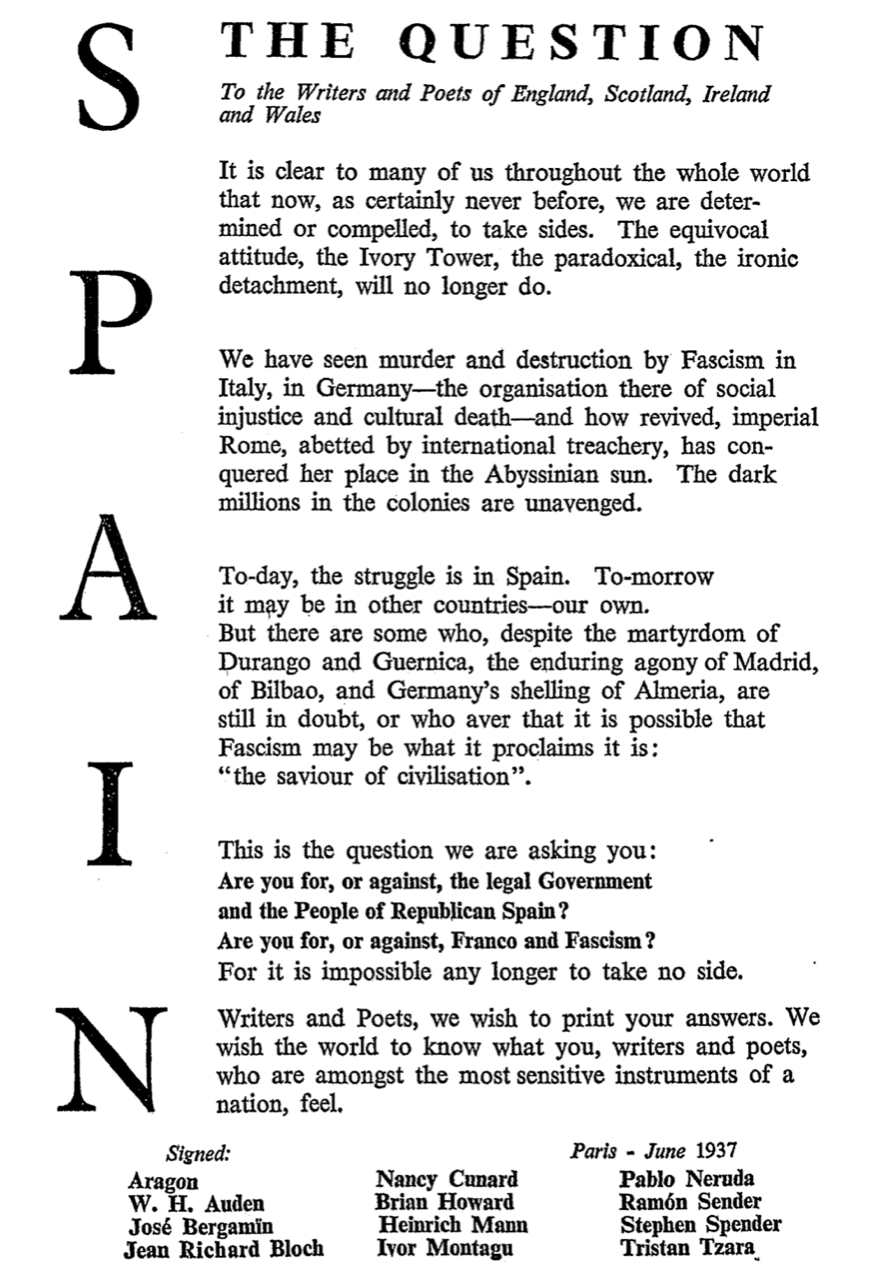
After a long and largely emotive preamble, the introduction to the survey finally asked:
“Are you for, or against, the legal government and the people of Republican Spain? Are you for or against Franco and Fascism? For it is impossible any longer to take no side. Writers and poets… we wish the world to know what you, who are amongst the most sensitive instruments of a nation, feel.”
Beneath the question are twelve named supporting signatories including, Jean Richard Bloch, the French critic, playwright and novelist (and member of the Communist Party); the Dadaist and Surrealist (and long-time member of the Communist Party) Louis Aragon; José Bergamin, the Spanish writer who spent his life trying to reconcile his Catholicism with his communism; and W. H. Auden and Stephen Spender, two poets both strongly affiliated with left-wing politics and communism.
With the question out of the way, (and after a short publisher’s note that explains, “It has been impossible to include all the answers received…”) the answers are presented to the reader.
Of the writers whose responses were reproduced in the pamphlet, one hundred and twenty-seven were ‘For the Government’, sixteen were classed as ‘Neutral’ and five were ‘Against the Government’. The first section is from those who were ‘For’ the Republican government. Although many of the named authors may not be familiar to modern readers, the ‘For’ list also included such historic ‘notables’ as Aldous Huxley, Arthur Koestler, Alistair Crowley, C. Day Lewis, Louis McNiece and Victor Gollancz.
Crowley the occultist, was typically dramatic and cryptic, responding:
“DO WHAT THOU WILT shall be the whole of the Law.
Franco is a common murderer and pirate: should swing in chains at Execution Dock.
Mussolini, the secret assassin, perhaps worse.
Hitler may prove a “prophet”; time will judge.
Love is the law, love under will.”
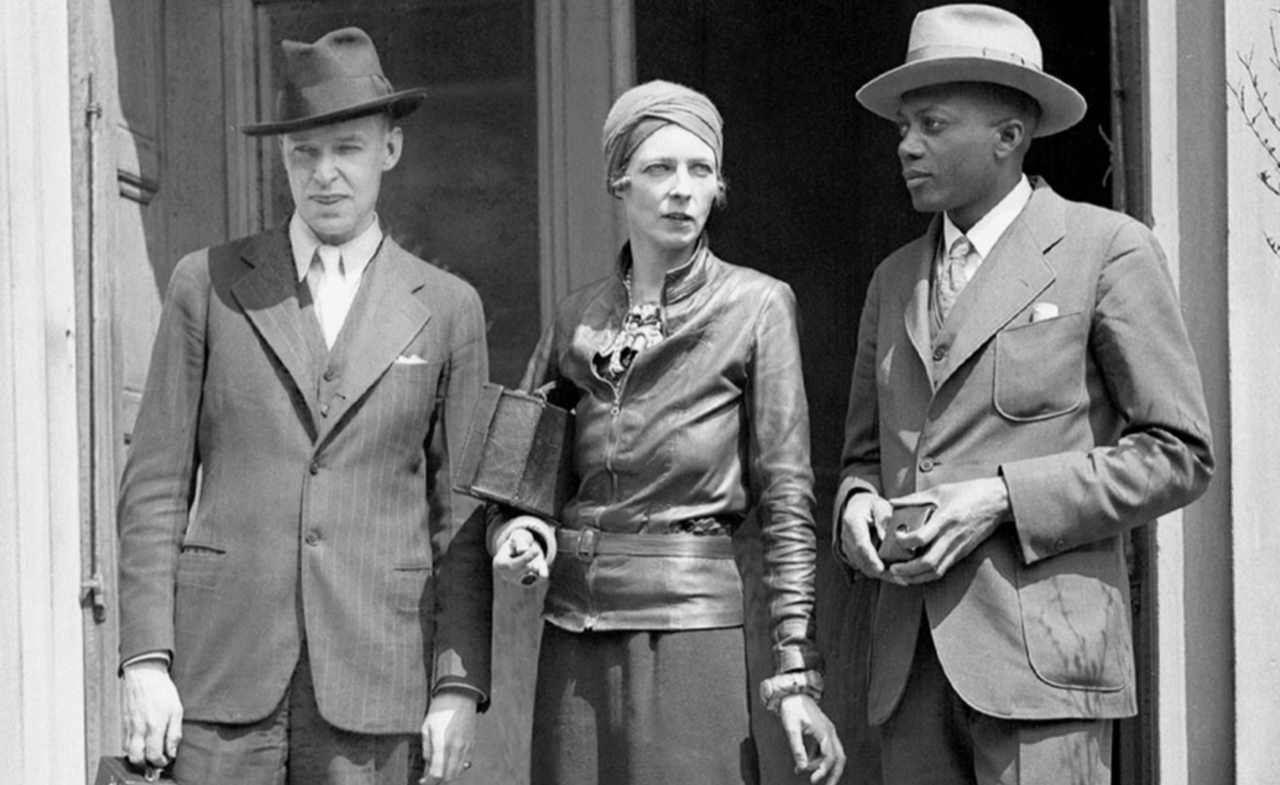
Whilst Nancy Cunard’s own contribution is filled with nebulous aspirations and meaningless platitudes:
“… Spain is not “politics” but life; its immediate future will affect every human who has a sense of what life and its facts mean, who has respect for himself and humanity. Above all the writer, the intellectual, must take sides. His place is with the people against Fascism; his duty, to protest against the present degeneration of the democracies.”
Indeed, most of the responses are passionate and refer to democratic process, and the evils of fascism, etc. and are often accompanied by a great deal of literary hand-wringing.
The collection of ‘Neutral responses’ (sixteen of them) provide an interesting alternative to the ‘For’ collection.
The romance novelist, Ruby M. Ayres was categorical in her reply and her words are still pertinent for us today.
“Uninformed interference in international politics is more to be dreaded than any anticipated danger resulting from the conflict in Spain. As a professional writer, I dread amateurs.”
Vita Sackville West makes a very valid point with regards the bias of the question itself.
“… One point in your questionnaire strikes me as ambiguous. You stress the ‘legal Government’ of Spain, as the Government you wish to support. Is this because it is the legal Government, or because it is a Communist Government? If because it is the legal Government, then you ought also to be prepared to support Hitler or Mussolini in the event of a rebellion against them. Yet I do not think you would do so?”
And the poet Ezra Pound was both eloquently dismissive and prescient in his own reply;
“Questionnaire, an escape mechanism for young fools who are too cowardly to think; too lazy to investigate the nature of money, its mode of issue, the control of such issue by the Banque de France and the stank of England. You are all hot. Spain. Is an emotional luxury. To a gang of sap-headed dilettantes.”
The last section is the small collection of the five respondents ‘Against the Government’. These provide some interesting and at times poignant, replies.
The first to appear is from the poet, author and critic, Edmund Blunden. He wrote:
“I know too little about affairs in Spain to make a confident answer. To my mind (subject to that first reservation), it was necessary that someone like Franco should arise – and although England may not profit by his victory I think Spain will. The ideas of Germany, Italy, etc., in your document do not square with those I have formed upon the whole of the recent history of those countries. Memories of 1914-18 perhaps do not allow me to see some incidents you mention in the isolated and flamboyant way the manifesto has them.”
Whereas the Welsh mystic and writer, Arthur Machen, replied simply:
“Mr. Arthur Machen presents his compliments and begs to inform that he is, and always has been, entirely for General Franco.”
Lady Eleanor Smith, writer and former Bohemian socialite, provided a sarcastically mocking response:
“I was delighted to receive your unprejudiced brochure. Naturally, I am a warm adherent of General Franco’s, being, like all of us, a humanitarian. The destruction of so many beautiful objects, and the massacre of so many innocent persons, makes one pity profoundly the ignorant red masses – subsidized by Russia – in Spain. Do you not agree?”
Conclusion
Writing three years after the end of the Spanish Civil War, George Orwell observed,
“Early in life I have noticed that no event is ever correctly reported in a newspaper, but in Spain, for the first time, I saw newspaper reports which did not bear any relation to the facts, not even the relationship which is implied in an ordinary lie. I saw great battles reported where there had been no fighting, and complete silence where hundreds of men had been killed. I saw troops who had fought bravely denounced as cowards and traitors, and others who had never seen a shot fired hailed as the heroes of imaginary victories; and I saw newspapers in London retailing these lies and eager intellectuals building emotional superstructures over events that had never happened. I saw, in fact, history being written not in terms of what happened but of what ought to have happened according to various ‘party lines’.” [2]
The degree by which the media manipulated, distorted or even neglected to report on events eighty-five years ago, now appears all too familiar to those of us sceptical of the, often blatant, ‘construction’ of news items by the legacy media.
Unsurprisingly, George Orwell’s own prickly response to the Left Review survey was not published in their pamphlet, but, fortunately, it has been preserved:
“Will you please stop sending me this bloody rubbish. This is the second or third time I have had it. I am not one of your fashionable pansies like Auden or Spender, I was six months in Spain, most of the time fighting, I have a bullet hole in me at present and I am not going to write blah about defending democracy or gallant little anybody…”
The pamphlet can be downloaded for free as a pdf.
Notes
[1] For more on the partiality of reportage during the Spanish Civil War, see Phillip Knightley’s 1975 study The First Casualty.
[2] Orwell, George [1943], ‘Looking Back on the Spanish War’, Peter Davidson (ed.), Orwell in Spain, London: Penguin Classics, 2001, 352.
n.b. When I came to write this short summary, I did so conscious of the current situation in the Ukraine and by the overt bias of the western media in reporting the events as they have unfolded.

